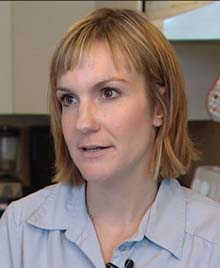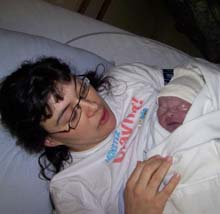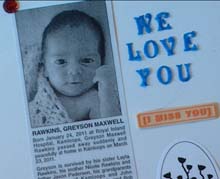
Kathy Tomlinson
Go PublicTwo B.C. families whose infants died inexplicably are sounding the alarm about mothers taking antidepressants while pregnant.
Both mothers took Effexor, which Health Canada has warned can have adverse effects on babies.
“I took the pills. I didn’t question. I trusted my doctor,” said Christiane Shultz, whose son Matthew died shortly after his birth in Kamloops in 2009.
An autopsy did not determine a cause of death. However, it listed the antidepressant drug taken by his mother as a contributing factor.
“Since there was venlafaxine [Effexor] exposure, this is a consideration as a contributor to death,” the report said.
Matthew’s father Amery Shultz said his son was blue at birth and stopped breathing in his arms.
 Nicole Rawkins is convinced her use of antidepressants contributed to her baby's death. (CBC)
Nicole Rawkins is convinced her use of antidepressants contributed to her baby's death. (CBC)
“I had rocked him to sleep and I made the assumption he was still breathing. That was not the case,” Shultz said. “Imagine … watching your child die before your eyes, very traumatically. We still relive it every day.”
Effexor is not approved for use during pregnancy, so when doctors prescribe it for pregnant women it is considered “off label” use. Shultz said she initially went on the drug because of depression over a previous marital breakup. To avoid the severe withdrawal symptoms, she kept taking it for eight years.
“Every time I got pregnant, I asked ‘Should I wean? Should I get off of these?’” Shultz said. “I was actually encouraged to stay on them because, what if you get depressed while you are pregnant?’”
The drug company Pfizer warns babies can suffer from “complications at birth requiring prolonged hospitalization, breathing support and tube feeding. The company lists reported symptoms as “feeding and/or breathing difficulties, seizures, tense or overly relaxed muscles, jitteriness and constant crying.”
Health Canada issued warnings to pregnant women in 2004 and 2006 also saying babies could suffer adverse effects or complications from withdrawal.
 Matthew Shultz, seen with his mother Christiane, died shortly after birth in 2009. (CBC)
Five infant deaths, including Matthew’s, have been reported by health professionals to the agency’s "reported adverse reactions" database since 2005, attributed to the mother’s antidepressant use during pregnancy. The database keeps track of suspected adverse effects from drugs in Canada, including death.
Matthew Shultz, seen with his mother Christiane, died shortly after birth in 2009. (CBC)
Five infant deaths, including Matthew’s, have been reported by health professionals to the agency’s "reported adverse reactions" database since 2005, attributed to the mother’s antidepressant use during pregnancy. The database keeps track of suspected adverse effects from drugs in Canada, including death.
“We will never prove that this drug killed our son,” Shultz said. “But it’s our life’s mission to make sure other families know [about his death]. That’s Matthew’s legacy.”
Another baby born in Kamloops, seven-week old Greyson Rawkins, also died unexpectedly this year. His mother took Effexor during pregnancy and while she was nursing.
“Why was I taking a drug where there was no studies done for pregnant women? That’s ludicrous,” Nicole Rawkins said.
She was taking 450 milligrams of the drug daily, twice the usual recommended dosage. In March, Rawkins woke up to find her son dead.
“I knew something was wrong right away because he was so cold and he was lying next to me and he wasn’t moving,” Rawkins recalled. “I totally think it was the drug.”
Greyson’s autopsy called his death “unexplained” but cited his mother Nicole’s use of Effexor as a possible risk factor.
Rawkins said when Greyson was born, he was immediately sent to the intensive care unit for several days. She said a nurse told her he was suffering from drug withdrawal and she should watch him closely.
 Greyson Rawkins was seven weeks old when his mother found him dead.
“She said that I had to keep an eye on him. I wish that I had taken her advice better,” Rawkins said. “She said it’s from the Effexor.”
Greyson Rawkins was seven weeks old when his mother found him dead.
“She said that I had to keep an eye on him. I wish that I had taken her advice better,” Rawkins said. “She said it’s from the Effexor.”
After she started nursing — effectively giving him the drug again — Rawkins said he slept most of the time.
“Most people don’t want to talk about him, but he was a little person. He should still be here,” Rawkins said.
Duncan Ross, the Shultz’s family doctor, said he is more hesitant to prescribe antidepressants to pregnant women as a result of Matthew’s death.
“It certainly led me to back away from [prescribing] them during pregnancy,” Ross said. “There is reason enough to be suspicious.”
Ross said he believes, in general, that antidepressants are overprescribed.
“There isn’t a fear of them [among doctors] that would hold anybody back,” he said. “It is a blanket treatment for … minor psychological issues.”
He said doctors are complacent because the conventional wisdom is the drugs are safe. He said doctors also fear taking a woman off antidepressants could endanger her health by putting her through withdrawal and making her more depressed.
“Evidence of harm outweighs any evidence of benefit,” insisted Barbara Mintzes, a researcher with UBC’s Therapeutics Initiative, a group that analyzes existing studies on the effects of prescription drugs.
“To me, it seems crazy that pregnant women are getting the message not to have a single drink in pregnancy, but that they should be taking antidepressants, because of a depression they had three years ago,” Mintzes said.
She said doctors should be more aware of the potential risks, particularly if their patients are only mildly or moderately depressed.
A 2001 analysis of Pharmacare records indicated five per cent of pregnant women in B.C. take antidepressants, twice as many as three years earlier.
“It would be useful to have a conversation with women of reproductive age … just to let them know [antidepressants] are not approved for use in pregnancy and there really isn’t any evidence of benefit from use in pregnancy,” Mintzes said.
Christiane Shultz said she weaned herself from Effexor right after Matthew died. She has since given birth to a healthy boy.
“I felt better off of them than when I was on them,” she said. “Sure, I was in the deepest hole of burying my child [while going off the drug] but I was also starting to regain my other children back. I haven’t been this happy in a long time.”
“Before you trust your doctor you’ve got to do some research on your own,” advised Nicole Rawkins. “Doctors are overworked and you can’t blame them. They are trying to help you, but they can’t read every detail.”
Accessibility Links
Comments (413)
Hide comments-
5
-
10
-
25
-
50
comments per pageat 6:51 AM ETI took Effexor for 4 years before contemplating pregnancy. My doctor advised me that I must be weaned prior to conceiving and that Effexor was absolutely contraindicated during pregnancy. I experienced all the withdrawal symptoms other posters here have talked about. It was a hellish nightmare of visual disturbances, electric 'zaps' in my face and hands, dizzy spells and palpitations. However, not once did I ever consider taking the drug again, despite how awful I felt. I can't understand how medical opinions on the safety of this medication during pregnancy can vary so greatly. I don't think there's a gray area here. Since many medications cannot be tested on pregnant women, obviously, the safest route is to not take them while pregnant.
Perhaps some doctors believe that treatment of severe anxiety or depression has benefits that outweigh the risks of that medication on the fetus, but in my experience the pregnancy itself made me feel much better emotionally (and hence, physically) than taking Effexor. My hormone levels seemed more balanced (many women experience peaks in their depression or anxiety related to where they are in their menstrual cycle) and my focus was on my baby, not on my anxiety. Of course, this is my experience only and I can't speak for others.
I find it sad that so many people say that a woman with depression or anxiety shouldn't consider having children. They might as well say the same thing to a woman with diabetes or any number of 'physical' diseases. Generalized anxiety disorder, along with many other mood disorders, has a physiological cause - an imbalance of serotonin and/or norepinephrine. Imagine what it would feel like to go through your entire day in a constant state of 'flight or fight'. Rating0Agree with comment (0 people agree)Disagree with comment (0 people disagree)ReplyPolicyReport abuse (0)
at 5:12 AM ETEffexor is a horrible drug. The withdrawal symptoms feel like electrical zaps throughout your brain. It's a sharp jolt, and you feel nauseous immediately following the zap.
---
I figure I might as well offer my experience since I tried Effexor for three months. It didn't work for me (but the next medication I tried, Wellbutrin, sure does).
I noticed no side effects while on the medication. Withdrawal was mildly unpleasant. I tapered off in accordance with my doctor's instructions. I was moderately light-headed at times for about ten days, no worse than you would get with a cold. I got the "Brain zaps" you mention but they were mild and only a few times an hour, mostly if I moved my head suddenly.
Not everyone experiences the worst symptoms you described, as intensely as you described them. Rating2Agree with comment (2 people agree)Disagree with comment (0 people disagree)ReplyPolicyReport abuse (0)
at 5:05 AM ETAny doctor that told you venlafaxine is "known safe" for pregnancy is unfortunately lying or ignorant.
It is (along with most other antidepressants) a pregnancy class C drug according to the American FDA.
"Animal reproduction studies have shown an adverse effect on the fetus and there are no adequate and well-controlled studies in humans."
In extreme cases, it may be justified during pregnancy if the risk of discontinuing is very high, but it's recommended to cease use during pregnancy.Rating2Agree with comment (2 people agree)Disagree with comment (0 people disagree)ReplyPolicyReport abuse (0)
at 4:06 AM ETEffexor Lawsuit Compensation For Birth Defects
Effexor Birth Defects
Effexor (venlafaxine) is an anti-depressant / anti-anxiety drug marketed by Wyeth Laboratories and has only been on the market since 2004. However, numerous SSRI (selective serotonin reuptake inhibitor) birth defect studies show a positive correlation between birth defects in children born to mothers who were prescribed the drug while pregnant.
The U.S. Food & Drug Administration (FDA) lists Effexor and other SSRI drugs such as Celexa and Lexapro in Pregnancy Category C - which means that animal reproduction studies have shown an adverse effect on the fetus. Some of those birth defects include:
PPHN
The following signs and symptoms may indicate a baby has PPHN:
rapid breathing (also called tachypnea)
rapid heart rate
respiratory distress, including signs such as flaring nostrils and grunting
cyanosis (when the skin has a bluish tinge), even while the baby is receiving extra oxygen to breathe
Abdominal Birth Defects / Omphalocele.
Autism Spectrum Disorders (ASD) In June 2011, the Archives of General Psychiatry published a study which found a strong correlation between autism birth defects and antidepressants
Anal atresia
Cardiac (heart) defects
Cleft lip and cleft palate
Clubfoot
Craniosynostosis (skull defect)
Genital malformation
Limb defects
Spina Bifida
http://injury-law.freeadvice.com/injury-law/drug-toxic_chemicals/effexor-lawsuit.htm
http://www.childrenscolorado.org/wellness/info/parents/20830.aspxRating5Agree with comment (5 people agree)Disagree with comment (0 people disagree)ReplyPolicyReport abuse (0)
at 10:07 PM ETAn autopsy did not determine a cause of death. However, it listed the antidepressant drug taken by his mother as a contributing factor.
_________________________________________________
Something is wrong with that. If they can't determine a cause of death, how can the "contributing factor" be anything more than speculation?
I'm not making light of SIDS, because it's every parent's worst nightmare, and I'm not advocating the use of heavy drugs by pregnant women. But a true contributing factor has to contribute to something that is known. Rating2Agree with comment (12 people agree)Disagree with comment (10 people disagree)ReplyPolicyReport abuse (0)
Log in or Sign up to submit your comment.